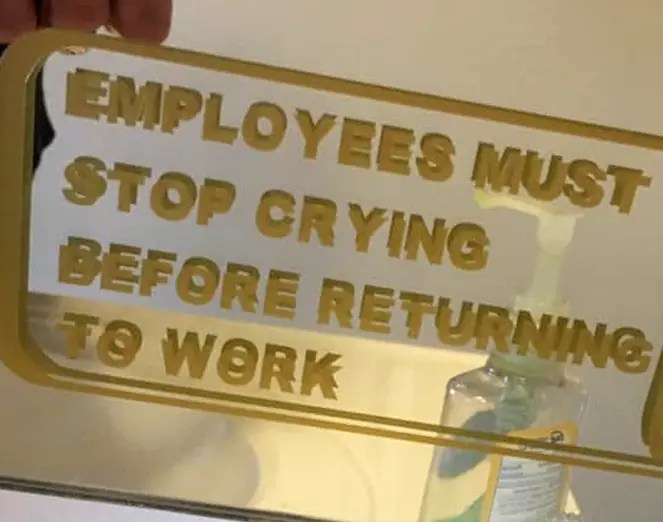

He’s been doing nothing but roids the last few years, the transformation has been pretty crazy.


He’s been doing nothing but roids the last few years, the transformation has been pretty crazy.


I’m more surprised that anyone gives a shit at all that they have the time to go do something like a review bomb or try to organise a boycott. People must have a lot of free time on their hands, I barely have time to play a video game, let alone sacrifice valuable free time to go organise a boycott.
If a game is bad or costs too much, I just forget about it and move on. Loads of other things I have to do with my day, and there are a billion other games I can play instead.
I played Warhammer 2 a bit, but saw their shitty patches that broke the game every time, so I just uninstalled it and forgot about it, and CA. I recommend people do that instead. Loads of other fun games to play instead.
UT is such a beautiful state. I miss autumn in Big Cottonwood Canyon. The Day’s Fork hike has some of the most beautiful colours I have ever seen.


Removed by mod


I agree with you about that, but these employees have chosen to do a job where they come face to face with customers daily, and some of those customers may get offended by seeing an employee wearing a BLM badge, in red states for example. The company doesn’t want to antagonise a potential customer and lose a sale, so they’re asking that no employees wear any political markings. And honestly, I think that’s a fair request if you work in a customer-facing role.
Notice that this ruling only applies to Whole Foods workers, not Amazon warehouse workers, who can probably wear whatever they want since they don’t deal with customers.


You actually can fire people based on their political beliefs, because believe it or not, political affiliation is not a protected class under current US federal law (maybe some state law though). There are only 7 current federally protected classes: age, race, sex, religion, marital status, disability, and sexual orientation. That’s why Republicans have been announcing they want to make political affiliation a protected class soon, because I guess that’s the next big battleground, is employers start to hire/fire based on politics.
I take your points, but I guarantee you this isn’t a decision about politics by Amazon, but purely a maximisation of revenue decision. Whole Foods employees interact with customers face to face, every day, all across the US, from blue states to red states. They know that their customers in some places consider BLM to be a political organisation, one that they don’t support, and that goes for proud boys, KKK, whatever. The point is, you don’t want to antagonise any customers coming in through the door, and corporate is aware that people are awfully sensitive these days and ready to kick off over any tiny thing, so to ensure no customer gets offended and takes their business elsewhere, and to ensure a policy which can be applied nationally for all states where Whole Foods exists, it’s just easier to say they won’t allow anything which their customers could potentially consider political.
That’s all this is, it’s not the political dog whistle some are making it out to be. This is just corporations wanting to remain neutral and take money from every customer, not just liberal ones. Hence I agree with this policy, it’s not coming from a bad place and it’s not an absurd request either.
And yes, as you said, not allowing someone to wear a religious article of clothing is a lawsuit waiting to happen, which will be a slam dunk, but this isn’t the same.


I think you’re way into the weeds here and forget the most important thing to remember about “freedom”: things like the Bill of Rights and the Constitution are a compact between you and the government, not you and private companies. Private companies don’t owe you anything besides whatever the government has expressly legislated, such as explicit protection for religious clothing and icons like crosses, Sikh turbans, etc.
However, beyond that, individual companies have the right to request their employees look and dress in certain ways. The flip side there is, if you don’t like those rules, you are free to not work there anymore.
Of course, legislators can always choose to pass laws forcing companies to allow more exemptions, but that hasn’t happened yet for displays of a political organisation.


It’s not just a corporate thing, police, military, and fire brigade aren’t allowed to wear overt political badging either.
There’s a general rule that if you work for an organisation which asks you to wear a work related uniform of some kind, you don’t get to add anything to it, political or otherwise. You don’t see bobbies with a Pink Floyd sticker on their chest.


BLM is a brand though. The lady who founded it just bought a £1.25M house in LA’s exclusive Topanga neighbourhood for all cash.
That doesn’t sound like some sort of grass roots, help lift people up, Mother Teresa sort of organisation to me.
Hence yeah, people don’t like BLM. Some don’t like what it stands for, while others, like me, don’t like it because the founders used it as a massive vehicle for grifting and lining their own pockets.


I’m with Amazon on this, seems a reasonable ask for employees to not wear any political/cultural/social things at work with their official uniform.


How much money do you get if you file?


Didn’t Colorado make big news a while ago for eliminating qualified immunity in the state?


Fucking hell, it’s all basically Call of Duty. Mental.


I have no idea, I’m not Republican.


I have no idea, I’m not a Republican.


I’m not sure. They definitely wanted one, but after that ridiculous plea deal which Weiss got, it’s clear he’s an absolute weasel and company man after all, and this is coming from a hardcore Sanders democrat. That plea deal was insanity – a misdemeanor for lying blatantly about drugs on a federal firearms transfer? And not paying taxes? Imagine if those charges were leveled against an ordinary person, and not a member of the ruling elite.
There needs to be a special counsel appointed, but fuck this Weiss guy.


Hope the driver goes to jail.


Why is it not accurate? House prices come down but cost of materials and labour stay constant or go up, what am I missing?
Also, I feel like we have gotten so far off track so as to forget what exactly we are arguing about.
The original discussion was how to fix the housing market so as to create way more affordable housing. My original argument was the government has to do that, by building houses at a loss, which only the government can do.
Your argument seems to have originally been that the true problem is the zoning and government red tape, but I feel like we have both come to the conclusion that neither of those is true. Firstly, even if zoning isn’t a problem, in places like LA and NYC there’s no physical space left to build, except vertically. In London, the only new land to build is way outside Zone 5. Furthermore, what incentive is there for private sector builders to flood the market with new supply, either horizontally or vertically? No industry likes it when the price of their product goes down, not a single one, and no industry is going to help that happen.
Finally, building vertically requires way bigger companies to get involved, meaning there are fewer of them, meaning it’s easier for them to collude to keep prices high. Building a ranch house out in Wyoming can be done by some local two-bit builder, but a skyscraper in Manhattan would need to be some big multinational. Ergo, even if the only solution is Shanghai style vertical flats, the prices are even more suspectible to collusion by the few big companies able and willing to build them.
Or, like I said, bypass all this bollocks and have the government build loads of houses and sell them at a loss, flood the supply and bring prices down for the altruistic, non-profit motive of getting more people into housing. Done and done.


Your own answer from earlier said so: increase supply massively whilst demand stays constant, means prices come down. Fair enough.
Well, if prices come down, margins by definition decrease, because building materials and labour aren’t decreasing too.
Ergo, even if zoning restrictions were relaxed massively, and permits handed out quickly and easily, there’s no incentive to flood the market like in 2007. This is especially true of big high rise, high density properties, as there usually are only a few companies who can build such buildings (in central London there’s like 4), so it makes collusion to keep supply low much easier. Sort of like how OPEC works.
That’s pretty fucked up. Usually those dog handlers get really attached to their dogs, to the point of some committing suicide if the dog dies in line of duty. On top of that, most other cops won’t tolerate abusing a police dog, so I’m surprised his fellow cops didn’t get some vigilante justice in.